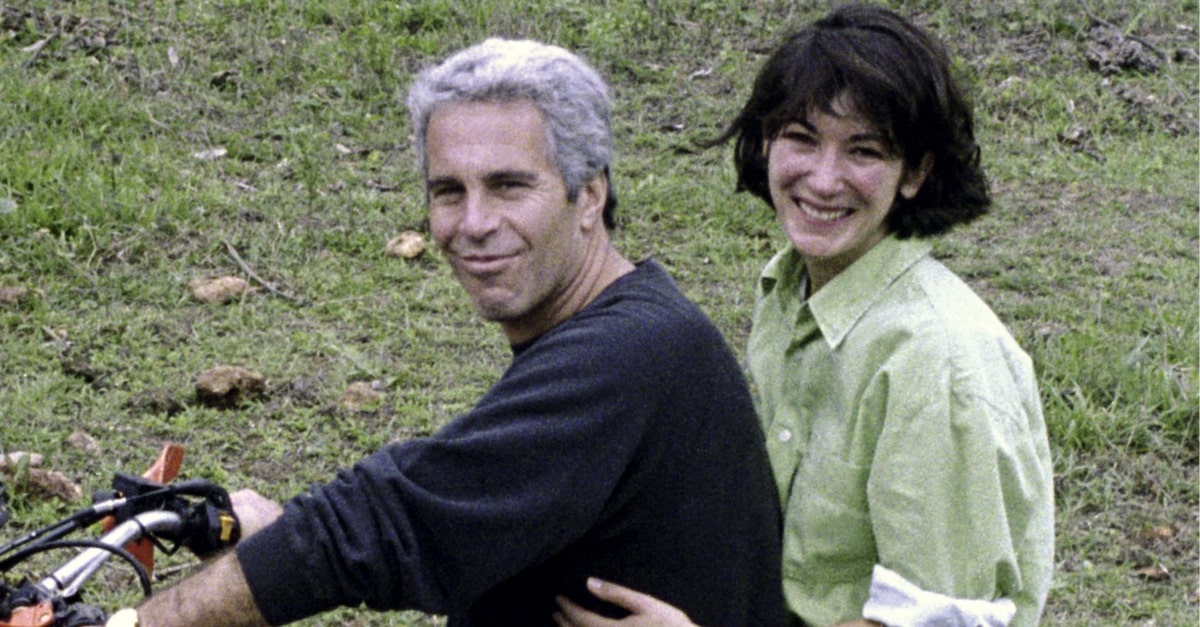
Prosecutors said that they found this photograph of Jeffrey Epstein and Ghislaine Maxwell during the 2019 raid on Epstein’s New York townhouse.
Jeffrey Epstein’s victims filed a pair of class action lawsuits accusing Deutsche Bank and JPMorgan Chase of “complicity” in his crimes, claiming the mega banks ignored reds flags of sex trafficking for their own profit.
The lawsuits allege that the banks “knowingly benefited and received things of value for assisting, supporting, facilitating, and otherwise providing the most critical service for the Jeffrey Epstein sex trafficking organization to successfully rape, sexually assault, and coercively sex traffic” girls and young women.
Filed by women anonymized as “Jane Doe,” the lawsuits were filed in the Southern District of New York — where Epstein and his co-conspirator Ghislaine Maxwell were prosecuted — on Thursday, the day that New York’s Adult Survivors Act went into effect.
That statute gave alleged victims of sexual abuse another opportunity to raise claims that otherwise would have been barred by the statute of limitations.
Epstein victims’ longtime lawyer Bradley Edwards, who signed the lawsuit, also cites the Trafficking Victim Protection Act (TVPA) and, against Deutsche specifically, the Racketeer Influenced and Corrupt Organizations Act (RICO). Combined, the federal complaints span roughly 180 pages in total.
Other prominent attorneys for Epstein victims, including David Boies and Sigrid McCawley, have their names attached to both complaints.
Both similarly worded, the complaints accuse both of the banks of intimate knowledge of Epstein’s empire of predation.
“The Epstein sex-trafficking venture’s purpose included enticing, obtaining, harboring, and transporting the young victims without drawing unwanted attention from law enforcement,” they state in identical passages. “The venture had everything a sex-trafficking organization needed — funding, infrastructure, the appearance of legitimacy, and perhaps most importantly a complicit banking institution. It was by many accounts the most powerful and wealthiest sex-trafficking venture ever created.”
“The Epstein sex-trafficking venture knowingly used means of force, threats of force, fraud, coercion (including threats of serious harm or physical restraint), and abuse of law and the legal process, to cause Jane Doe 1 and many dozens of others similarly situated to engage in commercial sex acts,” they continue.
As came into focus during Maxwell’s trial, victims said that Epstein lured or abused them across the United States and internationally, including in New York, New Mexico, Florida, the U.S. Virgin Islands, the United Kingdom, and France. The women say that the banks should have known this around the time of Epstein’s first arrest in Palm Beach, Florida.
“The 2006 criminal investigation uncovered a mountain of evidentiary information that became public, including documents obtained through trash pulls outside Epstein’s home, documents discovered in a search warrant, and extensive travel records, revealing details about Epstein’s life-style, daily activities, and pertinently the unique manner of operation for his sex-trafficking venture,” the lawsuits say.
Epstein’s plea deal shortly after allowed him to serve a brief term in a county jail — largely on work release — on counts of soliciting prostitution of a minor. Though the Florida prosecution was widely criticized as ending in a sweetheart deal, it also produced a lengthy public record that the victims say that the banks should not have missed.
“For instance, it was revealed that until the time of his Florida arrest, Jeffrey Epstein was sexually abusing three to four young females per day, in every location he was in at the time; sexually abusing young girls and women was a full-time job for him, from which he never took a vacation or hiatus,” the complaints say.
The Miami Herald‘s reporting on the backstory of that sweetheart plea deal, and the non-prosecution agreements that it included, has been credited for reopening Epstein and Maxwell’s investigations. Authorities likened Epstein’s cycle of abuse to a pyramid scheme, in which one victim would be paid to lure another, each receiving hush money and a finder’s fee.
The class action lawsuits note that this cycle continued after Epstein’s release in Florida, allegedly fueled by his financial relationships with the banks.
“From approximately 2000 through 2013, JP Morgan was the bank complicit in seeing to it that Epstein could abuse countless young females and could grow his sex-trafficking operation,” the lawsuit against that bank says.
According to the victims, Deutsche’s role came later, after JP Morgan banker Paul Morris became an employee of the German lender in November 2012.
“Soon after joining Deutsche Bank, Morris suggested to senior management that Epstein was a potential client who could generate millions of dollars of revenue as well as leads for other lucrative clients to Deutsche Bank,” the lawsuit against Deutsche states.
Both lawsuits level four counts under the TVPA and New York Adult Survivors Act. The complaint against Deutsche contains an additional RICO count. They both seek unspecified damages against the banks.